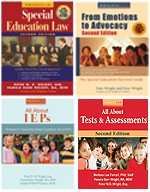What's In Store at Wrightslaw?
![]()
Special Ed Law & Advocacy Training (6.5 hrs)
25% Off the Wrightslaw Bundle of 4 PRINT books for $58.35 (Sorry, coupons not accepted on this product)
Includes Wrightslaw: Special Education Law, 2nd Ed., Wrightslaw: From Emotions to Advocacy, 2nd Ed., Wrightslaw: All About IEPs and Wrightslaw: All About Tests and Assessments, 2nd Ed.
New! The Wrightslaw Bundle is now available as an immediate PDF download. All four Wrightslaw books as PDFs for just $49.95!
![]()
FAQs About Your Child’s Eligibility
Q: What does the school do with these evaluation results?
A: The information gathered from the evaluation will be used to make important decisions about your child’s education. All of the information about your child will be used:
-
to decide if your child is eligible for special education and related services; and
-
to help you and the school decide what your child needs educationally.
Q: How is a decision made about my child’s eligibility for special education?
A: There are two criteria that must be met for your child to be eligible for special education.
Does your son or daughter have a disability?
Does your child "by reason thereof,
need special education and related services"?
(NOTE: See page 128 of Wrightslaw:
From Emotions to Advocacy for a discussion of these issues)
The decision about eligibility will be made after your child has been evaluated and the evaluations results are complete.
Under the IDEA, parents are included in the group that decides a child’s eligibility for special education services. This group should look at all information gathered during the evaluation and decide if your child meets the definition of a “child with a disability.” This definition is in the IDEA. (See Chapter 15, IDEA: Definitions in Wrightslaw: From Emotions to Advocacy)
If your child is found eligible for special education services under the IDEA, you and the school will work together to design an educational program for your child. You can learn more about this in FAQs: Your Child's IEP [LINK}
Q: Can I get a copy of the school's evaluations on my child?
A: Yes. As the parent, you have the right to receive a copy of the evaluation report on your child and the paperwork about your child’s eligibility for special education and related services.
Q: What are these "disability categories?"
A: The Individuals with Disabilities Act of 1997 (IDEA) lists 13 disability categories:
-
Autism
-
Deafness
-
Deaf-blindness
-
Hearing impairment
-
Mental retardation
-
Multiple disabilities
-
Orthopedic impairment
-
Other health impairment
-
Serious emotional disturbance
-
Specific learning disability
-
Speech or language impairment
-
Traumatic brain injury
-
Visual impairment, including blindness
To find out more about these disabilities and how IDEA defines them, read Chapter1 16 and 17 of FETA and visit the NICHCY site for “General Information about Disabilities.”
Q: What happens if the school says my child is not eligible for special education services?
A: If the group decides that your child is not eligible for special education services, the school system must tell you this in writing and explain why your child has been found “not eligible.”
Under the IDEA, you must also be given information about what you can do if you disagree with this decision.
Read the information the school system gives you. Make sure it includes information about how to challenge the school system’s decision. If that information is not in the materials the school gives you, ask the school for it.
Contact your state’s Parent Training and Information (PTI) center. The PTI can tell you what steps to take next. To find out how to contact your PTI, check the Directory of Parent Training Information Centers in the Getting Help section of this site.
More FAQ Sheets on FetaWeb.com
FAQs
about Special Education - What Is it? Who is Eligible?
FAQs about Your
Child's Evaluation
FAQs about
Your Child's Eligibility
FAQs about Writing
IEPs
FAQs about Reevaluations
FAQs - Resolving
Disputes with the School
Wrightslaw:
From Emotions to Advocacy
To learn more about evaluations, read
Chapter 8. Learn how to organize your child's file in Chapter 9.
To learn about test scores and how to measure your child's progress,
study Chapters 10 and 11.
You should also read Chapter 17, IDEA - Section 1414: Evaluations,
Eligibility, IEPs, and Placement.
This article is an excerpt from "Questions Often Asked by Parents about Special Education Services", NICHCY Briefing Paper LG1 (4th Edition), September 1999.
NICHCY Briefing Papers are developed in response to questions and concerns of individuals and organizations that contact the Clearinghouse. NICHCY disseminates other materials and can respond to individual requests for information.
This document was reviewed by the U.S. Office of Special Education Programs for consistency with the Individuals with Disabilities Education Act Amendments of 1997, Public Law 105-17, and the final implementing regulations published March 12, 1999.
For further
information and assistance, or to receive a NICHCY Publications Catalog,
contact:
NICHCY
P. O. Box 1492,
Washington, DC 20013
Phone: 1-800-695-0285 (Voice/TTY) and (202) 884-8200 (Voice/TTY).
Visit the NICHCY website at www.nichcy.org
or e-mail at: nichcy@fhi360.org
Copyright © 1998-2022, Peter W. D. Wright and Pamela Darr Wright. All rights reserved. Contact Us
